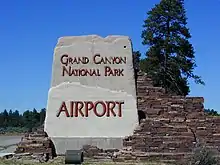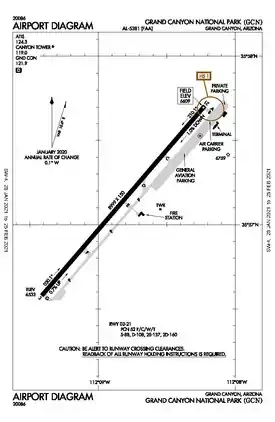Grand Canyon National Park Airport
Grand Canyon National Park Airport (IATA: GCN, ICAO: KGCN, FAA LID: GCN) is a state-owned public-use airport located in Tusayan, Arizona. A CDP in unincorporated Coconino County, Arizona, United States.[2][3] It is near Grand Canyon National Park, 7 miles (6.1 nmi; 11 km) from the South Rim of the Grand Canyon. The airport is primarily used for scenic tours and charter flights, but there is scheduled commercial service.
Grand Canyon National Park Airport | |||||||||||
|---|---|---|---|---|---|---|---|---|---|---|---|
 | |||||||||||
| Summary | |||||||||||
| Airport type | Public | ||||||||||
| Owner | State of Arizona | ||||||||||
| Serves | Grand Canyon | ||||||||||
| Location | Tusayan, Arizona | ||||||||||
| Elevation AMSL | 6,609 ft / 2,014 m | ||||||||||
| Coordinates | 35°57′08″N 112°08′49″W | ||||||||||
| Website | http://www.azdot.gov/ | ||||||||||
| Maps | |||||||||||
 FAA airport diagram as of January 2021 | |||||||||||
 GCN  GCN | |||||||||||
| Runways | |||||||||||
| |||||||||||
| Helipads | |||||||||||
| |||||||||||
| Statistics (2015) | |||||||||||
| |||||||||||
As per Federal Aviation Administration records, the airport had 294,436 passenger boardings (enplanements) in calendar year 2008 and 354,624 enplanements in 2007.[4] According to the FAA's National Plan of Integrated Airport Systems for 2009–13, it is categorized as commercial service - primary.[5]
History
The present day facility incorporates the site of the first official Grand Canyon airport, a landing field authorized by the U.S. Forest Service for commercial flights in 1925. The new airport first opened for business in October 1965. The airport terminal was completed and formally dedicated on October 20, 1967.
Today, the airport is the fourth most active air carrier airport in Arizona, following Phoenix Sky Harbor International Airport, Tucson International Airport, and Phoenix-Mesa Gateway Airport. Over 40 air taxi and commuter carriers serve the airport.
On August 16, 2009, Air Force One, carrying President Barack Obama, landed at Grand Canyon Airport at about 10am local time, for a four-hour visit of the Canyon by the President and his family.[6]
Facilities and aircraft
Grand Canyon National Park Airport covers an area of 859 acres (348 ha) at an elevation of 6,609 ft (2,014 m) above mean sea level. It has one runway designated 3/21 with an asphalt surface measuring 8,999 ft × 150 ft (2,743 m × 46 m). The airport also has two asphalt helipads that are 100 ft × 100 ft (30 m × 30 m).[1]
For the 12-month period ending April 30, 2010, the airport had 91,695 aircraft operations, an average of 251 per day: 95% air taxi, 4% general aviation, <1% scheduled commercial, and <1% military. At that time there were 34 aircraft based at this airport: 12% single-engine, 12% multi-engine and 76% helicopter.[1]
Airlines and destinations
| Airlines | Destinations |
|---|---|
| Grand Canyon Airlines | Boulder City |
Historical airline service
Grand Canyon National Park Airport had scheduled passenger jet service operated by several airlines at different times in the past including Air West, Hughes Airwest, Republic Airlines (1979-1986) and TriStar Airlines. Hughes Airwest operated Douglas DC-9-10 and McDonnell Douglas DC-9-30 jetliners to Las Vegas (LAS) and Phoenix (PHX) with continuing one stop, direct service to Los Angeles (LAX) and Burbank (BUR) while TriStar flew British Aerospace BAe 146-200 jets to Las Vegas (LAS) with direct one stop service to LAX. At one point, Hughes Airwest also operated Fairchild F-27 turboprop aircraft to Las Vegas and Phoenix with continuing, no change of plane service to Salt Lake City (SLC). Hughes Airwest was then merged into Republic Airlines which continued to operate DC-9 jet flights into the airport. During the summer of 1982, Republic was operating two daily DC-9 flights nonstop to Las Vegas (LAS) as well as daily nonstop DC-9 service to Phoenix (PHX) and direct one stop service daily to Burbank (BUR).[7] By the mid-1980s, Republic had ceased all service into the airport.[8]
Air West, the predecessor airline of Hughes Airwest, also operated Douglas DC-9 jets from the airport in addition to flying services with Fairchild F-27 turboprops. Bonanza Air Lines, which merged with Pacific Air Lines and West Coast Airlines to form Air West, flew from the airport prior to the Air West service and operated Fairchild F-27 turboprops as well with direct service to Phoenix and Salt Lake City with a daily round trip routing of Phoenix - Prescott, AZ - Grand Canyon Airport - Page, AZ - Cedar City, UT - Salt Lake City. Bonanza then expanded their F-27 propjet service with nonstop flights to Las Vegas and Phoenix. A 1966 Bonanza Air Lines print ad announced the air carrier's new service at the airport stating that Bonanza was "The only airline serving Grand Canyon" at the time.[9]
The airport was also served in the past by America West Airlines operating de Havilland Canada DHC-8 Dash 8 turboprop aircraft to Las Vegas and Phoenix. Alpha Air, a commuter airline based in California that operated as Trans World Express (TWE) flying Beechcraft 1900C turboprops via a code sharing agreement with Trans World Airlines (TWA), also provided service with nonstop flights to Los Angeles (LAX) or Burbank (BUR) with the latter service continuing on to LAX. Inland Empire Airlines, another California-based commuter air carrier, operated nonstop flights to Los Angeles as well with Swearingen Metro propjets.[10] Cochise Airlines, a commuter air carrier based in Arizona, served the airport with de Havilland Canada DHC-6 Twin Otter and Swearingen Metro turboprops and also Cessna 402 prop aircraft with flights to Phoenix, Tucson and other destinations in Arizona.[11] In 1999 Sunrise Airlines was flying daily nonstop service between Phoenix and the airport with Beechcraft 1900C turboprops.[12] Also in 1999, Scenic Air was operating daily nonstop service with a Grumman Gulfstream I propjet aircraft between Oakland, CA (OAK) and the airport.[13]
A number of commuter air carriers also provided scheduled nonstop passenger service between Las Vegas (LAS) and Grand Canyon National Park Airport over the years. These airlines and the turboprop and prop aircraft they operated on the Las Vegas-Grand Canyon route are as follows with this information being taken from various Official Airline Guide (OAG) flight schedules from 1979 to 1999:[14]
- Air Cortez - Beechcraft 18, Cessna 402, Fairchild F-27
- Air LA - British Aerospace BAe Jetstream 31
- Air Nevada - Cessna 402
- Air Resorts - Convair 580
- Air Vegas - Beechcraft 99, Cessna 402
- Eagle Canyon Airlines - Fokker F27
- Grand Airways - Cessna 402, Fairchild Swearingen Metroliner (Metro III aircraft). Grand Airways also operated McDonnell Douglas DC-9-30 jetliners into the airport on charter flights.[15]
- Las Vegas Airlines - Piper Chieftain
- Nevada Airlines - Douglas DC-3, Martin 404
- Pacific National Airlines - Douglas DC-3
- Royal American Airways - Vickers Viscount
- Scenic Airlines - Fokker F27
- Silver State Airlines - Embraer EMB-110 Bandeirante
Airlines that operated jet service in the past between Las Vegas and the airport included Air West, Hughes Airwest, Republic Airlines (1979-1986) and TriStar Airlines.
Commercial aircraft as large as the Boeing 767-300 wide body jetliner flown by Vision Airlines on charter service have operated into the airport in the past.[16]
Scenic air tours
Companies that operate air tours include Air Grand Canyon and Maverick Grand Canyon Helicopters.
Skydiving
In 2016 Paragon Skydive commenced tandem skydive operations at the Grand Canyon.
In September 2019, Christopher Swales, a 55-year-old man from the United Kingdom, died during a tandem jump. Police blamed holes in the parachute.[17]
References
- FAA Airport Form 5010 for GCN PDF. Federal Aviation Administration. Effective 29 July 2010.
- "Our Location Archived 2011-07-11 at the Wayback Machine." Grand Canyon Airlines. Retrieved on October 3, 2009.
- "Tusayan CDP, Arizona." U.S. Census Bureau. Retrieved on October 3, 2009.
- Passenger Boarding (Enplanement) Data for CY 2008. Federal Aviation Administration. Updated 18 December 2009.
- National Plan of Integrated Airport Systems for 2009–2013: Appendix A: Part 1 (PDF, 1.33 MB) Archived 2011-08-06 at the Wayback Machine. Federal Aviation Administration. Updated 15 October 2008.
- Wagner, Dennis (Aug 14, 2009). "Obama trip may cause some disruptions at Grand Canyon". The Arizona Republic.
- http://www.departedflights.com, Aug. 1, 1982 Republic Airlines system timetable
- http://www.departedflights.com, April 28, 1985 Republic Airlines system timetable
- http://www.departedflights.com, 1966 Bonanza Air Lines print ad, "Something Grand has happened at the Grand Canyon"
- http://www.departedflights.com, April 1, 1981 Official Airline Guide (OAG) Los Angeles-Grand Canyon schedules
- http://www.departedflights.com, April 15, 1975 & April 1, 1981 editions, Official Airline Guide (OAG), Grand Canyon Airport flight schedules
- http://www.departedflights.com, June 1, 1999 Official Airline Guide (OAG), Phoenix-Grand Canyon schedules
- http://www.departedflights.com, June 1, 1999 Official Airline Guide (OAG), Oakland-Grand Canyon schedules
- http://www.departedflights.com, Official Airline Guide (OAG) editions: Nov. 15, 1979; April 1, 1981; Feb. 15, 1985; Dec. 15, 1989; April 2, 1999
- http://www.airliners.com, photo of Grand Airways McDonnell Douglas DC-9-30 at Grand Canyon National Park Airport
- http://www.airliners.net, photo of Vision Airlines Boeing 767 at Grand Canyon National Park Airport
- https://nypost.com/2020/02/27/tourist-who-died-skydiving-in-grand-canyon-had-holes-in-parachute/
External links
- Grand Canyon National Park Airport (GCN) at Arizona DOT airport directory
- Aerial image as of 5 June 1992 from USGS The National Map
- FAA Airport Diagram (PDF), effective January 28, 2021
- FAA Terminal Procedures for GCN, effective January 28, 2021
- Resources for this airport:
- FAA airport information for GCN
- AirNav airport information for KGCN
- ASN accident history for GCN
- FlightAware airport information and live flight tracker
- NOAA/NWS weather observations: current, past three days
- SkyVector aeronautical chart, Terminal Procedures
